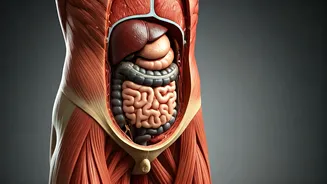Dietary Deficiencies
One of the most frequently made mistakes when trying to lose weight, particularly belly fat, involves an inadequate diet. Your body requires a sufficient
caloric deficit for fat loss, but it's not simply about eating less; it's about what you eat. Skipping meals, or undereating overall, can be counterproductive. When your body senses a lack of fuel, it can hold onto fat. Moreover, deficiencies in essential nutrients, like protein, can hinder muscle growth, which is critical for boosting your metabolism and burning fat. A well-rounded diet full of nutrient-dense foods, particularly protein, complex carbohydrates, and healthy fats, is the cornerstone of fat loss. Focus on incorporating whole, unprocessed foods like fruits, vegetables, lean proteins, and whole grains into your meal plan. Furthermore, paying attention to portion sizes and tracking your calorie intake can help create the necessary deficit without depriving your body of essential nutrients.
Cardio Overload
While cardio is undoubtedly valuable, excessive amounts can sometimes impede fat loss efforts. Too much high-intensity cardio can lead to elevated cortisol levels, a stress hormone that can promote fat storage, especially around the abdomen. Your body could also start breaking down muscle for energy if you're not balancing your cardio with sufficient protein intake and rest. The ideal approach involves a balanced exercise regime, consisting of both cardio and strength training. This combination allows for optimized fat loss and preserves muscle mass. Aim for a mix of moderate-intensity cardio, such as brisk walking or jogging, and high-intensity interval training (HIIT) sessions. Prioritize strength training to build muscle, which significantly increases your resting metabolism, causing you to burn more calories even when you're not exercising. Consider that the intensity, the duration, and the type of exercise should be varied to prevent your body from adapting and plateauing.
Inconsistent Workouts
Another key mistake that often undermines progress is inconsistent workout routines. Showing up sporadically can significantly impede your efforts. The body adapts to regular physical activity, and this consistency facilitates continuous fat loss. To achieve noticeable results, a sustainable and consistent workout schedule is necessary. This means establishing a routine and sticking to it, even when you don't feel motivated. Aim for regular workouts, incorporating both strength training and cardio, several times per week. The more regularly you exercise, the more efficient your body becomes at burning calories and reducing body fat. If you find it challenging to stick to a routine, consider enlisting a workout partner, joining a fitness class, or hiring a personal trainer. Make sure to schedule your workouts in advance, just like you would any other important appointment. Consistency is key when it comes to fat loss.
Ignoring Sleep, Stress
The final mistake often overlooked involves the crucial role of sleep and stress management in fat loss. A lack of sleep and chronic stress can elevate cortisol levels, promoting fat storage, especially in the abdominal area. Moreover, poor sleep disrupts hormonal balance, which can lead to increased hunger and cravings. It's essential to prioritize sleep and incorporate stress-reduction techniques into your routine. Aim for seven to nine hours of quality sleep each night to help regulate your hormones and support overall health. Manage stress levels through mindfulness practices, such as meditation or deep breathing exercises. Engage in activities you find relaxing, like spending time in nature or pursuing hobbies. Remember that the body heals and recovers during sleep, making it an essential component of any fat loss program. Taking care of your mental well-being is as important as physical exercise.























